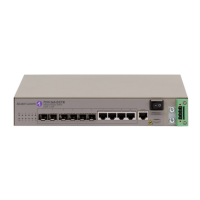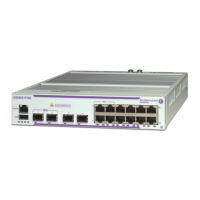Page 326 7450 ESS OS Basic System Configuration Guide
enable-icmp-vse
Syntax [no] enable-icmp-vse
Context config>system
Description This command enables vendor specific extensions to ICMP.
l4-load-balancing
Syntax [no] l4-load-balancing
Context config>system
Description This command configures system-wide Layer 4 load balancing. The configuration at system level can
enable or disable load balancing based on Layer 4 fields. If enabled, Layer 4 source and destination port
fields will be included in hashing calculation for TCP/UDP packets.
The hashing algorithm addresses finer spraying granularity where many hosts are connected to the network.
To address more efficient traffic distribution between network links (forming a LAG group), a hashing
algorithm extension takes into account L4 information (i.e., src/dst L4-protocol port).
The hashing index can be calculated according to the following algorithm:
If [(TCP or UDP traffic) & enabled]
hash (<TCP/UDP ports>, <IP addresses>)
else if (IP traffic)
hash (<IP addresses>)
else
hash (<MAC addresses>)
endif
This algorithm will be used in all cases where IP information in per-packet hashing is included (see LAG
and ECMP Hashing in the Interfaces Guide). However the Layer 4 information (TCP/UDP ports) will not be
used in the following cases:
• Fragmented packets
Default no l4-load-balancing
lsr-load-balancing
Syntax lsr-load-balancing {lbl-only | lbl-ip }
no lsr-load-balancing
Context config>system
Description This command configures system-wide LSR load balancing. Hashing can be enabled on IP header at an LSR
for spraying labeled IP packets over multiple equal cost paths in ECMP in an LDP LSP and/or over multiple
links of a LAG group in all types of LSPs. lbl-only—MPLS packet hashing is based on the whole label

